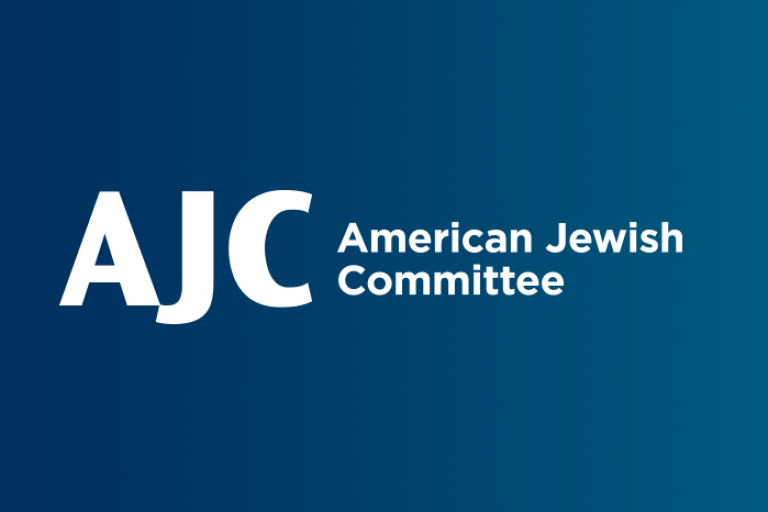May 6, 2015 — Brussels, Belgium
AJC has presented an action plan for European governments to address the intensifying crisis of antisemitism. The Call for Action came during a groundbreaking AJC strategy conference, “A Defining Moment for Europe," in Brussels.
"Antisemitism is a cancer that, left unchecked, will mestatize and threaten to destroy the democratic and pluralistic nature of Europe," said AJC Executive Director David Harris. Unlike 15 years ago, when European governments would too frequently dismiss AJC's oft-voiced concerns about attacks on Jews and refuse to identify their sources, the recent tragic events in Belgium, France, and Denmark have led some leaders to begin addressing the threats head-on.
Jan Jambon, Belgium’s Deputy Prime Minister and Minister of Security and the Interior, and Věra Jourová, European Commissioner for Justice, Consumers, and Gender Equality, delivered keynote addresses at the opening session Tuesday. Both speakers recognized that the surge of antisemitic incidents poses a fundamental threat to individual European countries and, more generally, to the European Union.
Many EU officials, Members of the European Parliament, ambassadors of EU member states, and leaders of Jewish communities from across Europe participated in the gathering. Senior AJC leaders attended the conference, including AJC President Stanley Bergman, who kicked off the conference. Altogether, 25 of the EU's 28 member states, plus the United States and Canada, were officially represented.
Jambon said the Belgian government is committed “to improve the level of security to the fullest extent” and to redouble efforts “to uphold and assert our own values and standards.” He reasserted his government's recent announcement that it will provide adequate resources for the security of synagogues and Jewish institutions, a move AJC welcomed.
"It is a tragedy, a disgrace for Europe, when Jewish communities feel unsafe in places of worship and in their homes," especially 70 years after they faced similar dilemmas on whether to stay or leave, said Commissioner Jourová, who has helped spearhead EU efforts to combat antisemitism.
The AJC action plan calls on European governments to make the fight against antisemitism an urgent priority for individual countries, and collectively for the entire EU. It specifies steps for governments to assess the severity of the problem; provide for the security of Jewish institutions and communities; invest in education that imparts European values; take on purveyors of antisemitism on the Internet and in social media; and recognize that vilification of Israel too often is a cover for expressions of antisemitism. The full Call to Action is available at www.ajc.org.
The current efforts of the U.S., French, and German governments were highlighted in a panel that featured Gilles Clavreul, France's Inter-ministerial Delegate on Racism and Antisemitism; Ambassador Dr. Felix Klein, Special Representative of Germany's Federal Foreign Office for Relations with Jewish Organizations and Antisemitism Issues; and Ira Forman, the U.S. State Department Special Envoy to Monitor and Combat Antisemitism.
Another panel featured European Muslim leaders--activists committed to defending and reinforcing European values in their own communities. They discussed the challenges and necessary strategies to confront and defuse Islamist extremism. A third panel addressed the steps required to secure vulnerable Jewish communities and assure a European Jewish future.
There was general agreement among the speakers throughout the conference that investing in education is essential -- but not sufficient. Of immediate concern is radicalization in prisons, inadequate intelligence cooperation among EU member states, and, above all, a failure of some national leadership to honestly assess and confront the sources of anti-Jewish violence. In his remarks, Harris poignantly asked about the meaning of education in a demographically changing Europe.
"How do you teach in the 21st century about events that took place 70 years ago when witnesses are dying, and some teachers and especially students are pushing back” on accepting the curriculum, he asked.
The AJC plan "calls on the European Union to promptly organize a high-level governmental conference on the ominous rise of antisemitism,” and “calls on the political institutions of the EU and its Member States to express at the highest levels a fundamental commitment to fight antisemitism.”
It also calls on civil society -- including faith leaders and other opinion-shapers -- to carry the message that antisemitism is socially, politically, and religiously unacceptable.
"If necessary, and however tragically, the Jews will leave, but where will Europe go?" asked Harris. "Will Europeans uphold their values or will they succumb?"
Prior to the conference, a senior AJC leadership delegation, led by Bergman and Harris, met privately with Věra Jourová, European Commissioner for Justice, Consumers, and Gender Equality; Jan Jambon, Belgium’s Deputy Prime Minister and Minister of Security and the Interior; Fernando Gentilini, the recently appointed EU Special Representative to the Middle East Peace Process; Ambassador Walter Stevens, Chair of the Political and Security Committee of the European External Action Service; and Israeli Ambassador to the EU and NATO David Walzer.
In 2004, AJC established the Transatlantic Institute to foster close relations among the U.S., Europe, and Israel. The institute is chaired by Robert Elman and directed by Daniel Schwammenthal.


